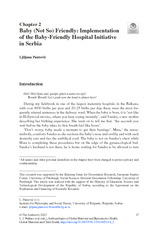Baby (Not So) Friendly: Implementation of the Baby-Friendly Hospital Initiative in Serbia
Poglavlje u monografiji (Objavljena verzija)
Metapodaci
Prikaz svih podataka o dokumentuApstrakt
The WHO and UNICEF launched The Baby-Friendly Hospital Initiative (BFHI) in 1991 with the goal of promoting breastfeeding. Four years later, this initiative was adopted in Serbia (then Yugoslavia). Although Serbia has officially been a part of the BFHI for over 26 years, less than 13% of children are currently exclusively breastfed for the first 6 months of life. Drawing on interviews, observations and document review, this chapter offers ethnographic insight into why the BFHI in Serbia has met with little success. I argue that the principles and practices of the initiative to promote breastfeeding have been both thinly learned and thinly applied by healthcare workers and therefore have had little positive impact on women’s empowerment to breastfeed or the rates of breastfeeding in the country. I show how the global Baby-Friendly Hospital Initiative implemented in Serbia in the early 1990s and the national level policies which renewed it in 2018 were severely constrained by social, pol...itical and economic conditions that hindered the uptake of the program by frontline health workers – namely the devastating effects of the civil war and international sanctions in the 1990s, and the deleterious effects of IMF policies on the Serbian healthcare system since the 2000s. The pressure of time due to high workloads, and understaffed hospitals, in combination with unsustainable national funds for implementation may contribute to the reality of the thin implementation of BFHI.
Ključne reči:
Breastfeeding / Baby-Friendly Hospital Initiative / Ethnography / Policy implementationIzvor:
Anthropologies of Global Maternal and Reproductive Health, 2022Izdavač:
- Springer
Kolekcije
Institucija/grupa
IFDTTY - CHAP AU - Pantovic, Ljiljana PY - 2022 UR - http://rifdt.instifdt.bg.ac.rs/123456789/2489 AB - The WHO and UNICEF launched The Baby-Friendly Hospital Initiative (BFHI) in 1991 with the goal of promoting breastfeeding. Four years later, this initiative was adopted in Serbia (then Yugoslavia). Although Serbia has officially been a part of the BFHI for over 26 years, less than 13% of children are currently exclusively breastfed for the first 6 months of life. Drawing on interviews, observations and document review, this chapter offers ethnographic insight into why the BFHI in Serbia has met with little success. I argue that the principles and practices of the initiative to promote breastfeeding have been both thinly learned and thinly applied by healthcare workers and therefore have had little positive impact on women’s empowerment to breastfeed or the rates of breastfeeding in the country. I show how the global Baby-Friendly Hospital Initiative implemented in Serbia in the early 1990s and the national level policies which renewed it in 2018 were severely constrained by social, political and economic conditions that hindered the uptake of the program by frontline health workers – namely the devastating effects of the civil war and international sanctions in the 1990s, and the deleterious effects of IMF policies on the Serbian healthcare system since the 2000s. The pressure of time due to high workloads, and understaffed hospitals, in combination with unsustainable national funds for implementation may contribute to the reality of the thin implementation of BFHI. PB - Springer T2 - Anthropologies of Global Maternal and Reproductive Health T1 - Baby (Not So) Friendly: Implementation of the Baby-Friendly Hospital Initiative in Serbia DO - 10.1007/978-3-030-84514-8_2 ER -
@inbook{
author = "Pantovic, Ljiljana",
year = "2022",
abstract = "The WHO and UNICEF launched The Baby-Friendly Hospital Initiative (BFHI) in 1991 with the goal of promoting breastfeeding. Four years later, this initiative was adopted in Serbia (then Yugoslavia). Although Serbia has officially been a part of the BFHI for over 26 years, less than 13% of children are currently exclusively breastfed for the first 6 months of life. Drawing on interviews, observations and document review, this chapter offers ethnographic insight into why the BFHI in Serbia has met with little success. I argue that the principles and practices of the initiative to promote breastfeeding have been both thinly learned and thinly applied by healthcare workers and therefore have had little positive impact on women’s empowerment to breastfeed or the rates of breastfeeding in the country. I show how the global Baby-Friendly Hospital Initiative implemented in Serbia in the early 1990s and the national level policies which renewed it in 2018 were severely constrained by social, political and economic conditions that hindered the uptake of the program by frontline health workers – namely the devastating effects of the civil war and international sanctions in the 1990s, and the deleterious effects of IMF policies on the Serbian healthcare system since the 2000s. The pressure of time due to high workloads, and understaffed hospitals, in combination with unsustainable national funds for implementation may contribute to the reality of the thin implementation of BFHI.",
publisher = "Springer",
journal = "Anthropologies of Global Maternal and Reproductive Health",
booktitle = "Baby (Not So) Friendly: Implementation of the Baby-Friendly Hospital Initiative in Serbia",
doi = "10.1007/978-3-030-84514-8_2"
}
Pantovic, L.. (2022). Baby (Not So) Friendly: Implementation of the Baby-Friendly Hospital Initiative in Serbia. in Anthropologies of Global Maternal and Reproductive Health Springer.. https://doi.org/10.1007/978-3-030-84514-8_2
Pantovic L. Baby (Not So) Friendly: Implementation of the Baby-Friendly Hospital Initiative in Serbia. in Anthropologies of Global Maternal and Reproductive Health. 2022;. doi:10.1007/978-3-030-84514-8_2 .
Pantovic, Ljiljana, "Baby (Not So) Friendly: Implementation of the Baby-Friendly Hospital Initiative in Serbia" in Anthropologies of Global Maternal and Reproductive Health (2022), https://doi.org/10.1007/978-3-030-84514-8_2 . .



